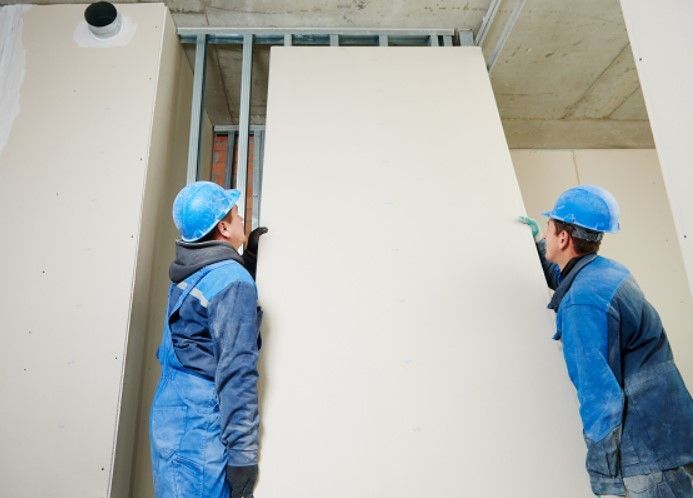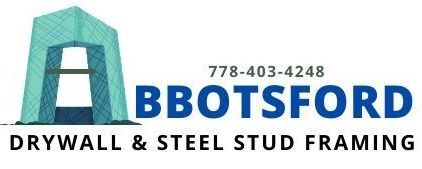Abbotsford Drywall and Steel Stud Framing
Drywall Repair Contractors Discuss Types of Drywall and Their Uses
Choosing the right type of drywall can make or break your home improvement project. Whether you're renovating a bathroom, soundproofing a home office, or tackling a full-scale remodel, the material you pick will influence not only the cost but also the longevity and safety of your investment.
Our
drywall repair contractors will walk you through the different types of drywall available and help you choose the one that best fits your needs. Keep reading.
Common Types of Drywall
Drywall comes in several different types, each with characteristics that make it suitable for specific applications. Below, we explore these common types of drywall and their pros and cons.
1. Standard Drywall
Standard drywall is the most commonly used type and is often found in living rooms, bedrooms, and ceilings. It’s the go-to choice for general construction and repair.
Pros
- Affordable
- Easy to install
- Readily available
Cons
- Not resistant to moisture, fire, or sound.
2. Moisture-Resistant Drywall
Juan Rodriguez explains that moisture-resistant or greenboard drywall has a special coating that makes it less susceptible to water damage. It's perfect for rooms with high humidity, like bathrooms and basements.
Pros
- Resistant to mould and mildew.
- Durable in wet environments.
Cons
- More expensive than standard drywall.
3. Fire-Resistant Drywall
Fire-resistant drywall contains fibres that help it resist burning, making it a safer option for certain rooms. This is most commonly used in garages, kitchens, and rooms with fireplaces.
Pros
- Provides an extra layer of safety against fires.
Cons
- More expensive
- Heavier than standard drywall.
4. Soundproof Drywall
Rachel Brown shares that soundproof drywall has dense layers that absorb and mitigate sound. It's great for home offices, bedrooms, or any space where noise reduction is a priority.
Pros
- Effective at reducing noise.
- Improve privacy.
Cons
- Pricier than standard types.
- May require special installation.
5. Eco-Friendly Drywall
Eco-friendly drywall is made from recycled materials and has lower emissions during production. It's suitable for any room, especially those prioritizing environmentally responsible choices.
Pros
- Lowers environmental impact.
- May contribute to LEED credits.
Cons
- More expensive
- Limited availability compared to standard types.
How to Choose a Drywall
Choosing the right drywall type is more than just about what's on the shelf. Your decision should consider factors like your budget and the location where you'll install the drywall. Let's explore these considerations in detail.
Budget
The cost of drywall can vary significantly depending on the type you choose. For instance, standard drywall is generally the most affordable option, whereas specialty types like fire-resistant or soundproof drywall have a higher price tag.
Tips on Balancing Costs and Needs:
| Tip 1 | Evaluate the needs of the room. Investing in fire-resistant drywall could be worth the extra cost for added safety if it's a space like a garage or kitchen. |
| Tip 2 | Consider the long-term benefits. Spending more on moisture-resistant drywall for bathrooms could save you future repair costs. |
| Tip 3 | Consider mixing types if you're working on a tight budget. For example, use standard drywall for most of the room, but opt for moisture-resistant drywall in key areas like sinks or bathtubs. |
Location (Interior/Exterior, Room Type)
The location where you'll install the drywall is crucial in determining the type you should use. For interior spaces, consider choosing soundproof or fire-resistant types. For areas prone to moisture, moisture resistance is the way to go.
Example:
Bathrooms
Given the high humidity, moisture-resistant drywall is often the best choice.
Kitchens
Fire-resistant drywall offers an extra layer of safety, making it an ideal choice.
Home Offices or Bedrooms
Soundproof drywall can be a godsend to minimize noise.
Type of Drywall - Influencing Factors
Choosing the right type of drywall isn't just a matter of preference or aesthetics. It's also an important decision that affects your project's cost, how long the installation will last, and how safe your space will be.
- Cost
Standard drywall is usually affordable but lacks specialized features like moisture or fire resistance. Moisture-resistant or fire-resistant may cost more upfront but can save you money in the long run by reducing the need for repairs or offering added safety features.
- Longevity
For example, moisture-resistant drywall in a bathroom or basement can significantly extend the lifespan of those rooms by preventing mould and mildew. Similarly, eco-friendly drywalls reduce the frequency of replacements.
- Safety
Fire-resistant drywall can provide extra minutes in a fire, giving you more time to evacuate safely. While not necessarily a safety feature, soundproof drywall can contribute to a more peaceful living environment, reducing stress and enhancing well-being.
Different Performance Characteristics of Drywalls
Each type of drywall is engineered with specific performance characteristics in mind:
Standard Drywall
Built for general usage, easy to install but offers no specialized benefits.
Moisture-Resistant Drywall
Designed to repel moisture, ideal for damp environments.
Fire-Resistant Drywall
Contains fire-retardant materials, offering added safety in case of fire.
Soundproof Drywall
Engineered to absorb and mitigate sound, contributing to a quieter environment.
Eco-Friendly Drywall
Manufactured with sustainable materials and processes, ideal for those looking to reduce their environmental impact.

Drywall Repair Services Are One Click Away
Choosing the right type of drywall is a decision that extends beyond mere aesthetics. It impacts the cost, longevity, and safety of your project. Your specific needs will dictate which type of drywall is best for your project.
Whether you're budget-conscious, seeking long-lasting materials, or looking to enhance safety, there's a type of drywall designed to meet those requirements. Consult with professionals for advice, especially for more complex or specialized projects.
Frequently Asked Questions
Do I need a permit for drywall repair in Vancouver?
For minor repairs, you typically won't need a permit. But, a permit may be required for larger renovations or if you're changing the wall's structure. Always check local regulations, especially if you're specifically looking for "drywall repair Vancouver," as different municipalities may have different rules.
What should I look for when choosing a drywall repair near me?
When looking for "drywall repair near me," consider the contractor's reputation, the number of years they have been in business, and customer reviews. Requesting multiple quotes to compare prices and services is also a good idea.
